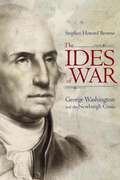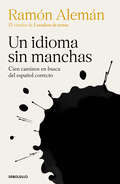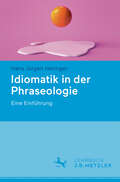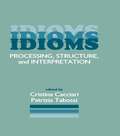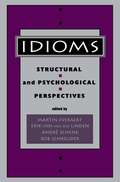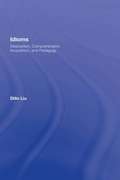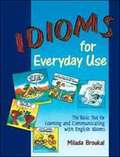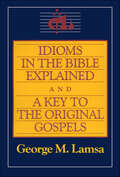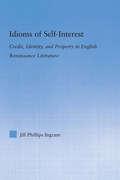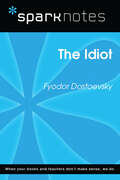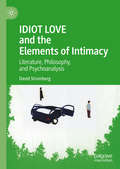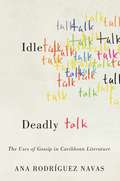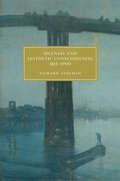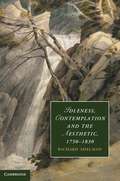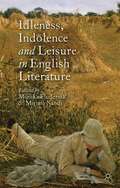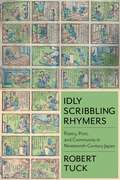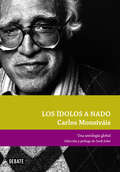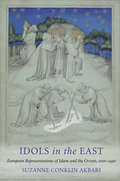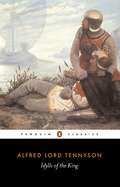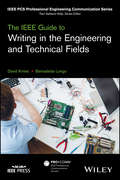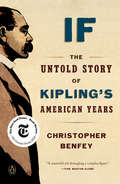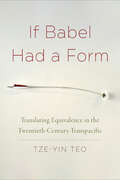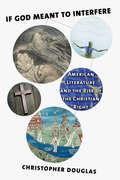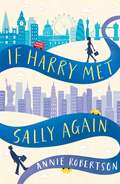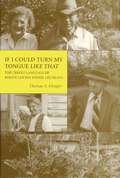- Table View
- List View
The Ides of War: George Washington and the Newburgh Crisis (Studies in Rhetoric & Communication)
by Stephen Howard BrowneA history and analysis of how George Washington stopped an attempted military coup at the end of the American Revolutionary War.History tells us that on a day when the forces of civil government confront the forces of military might, no one knows what may follow. Americans believe that they have avoided this moment, that whatever other challenges the country has faced, at least it never has had to deal with the prospects of a coup d’état. Stephen Howard Browne maintains that this view is mistaken, that in fact the United States faced such a crisis, at the very moment when the country announced its arrival on the world scene in the spring of 1783 in a rustic meeting hall along the Hudson River near Newburgh, New York. The crisis was resolved by George Washington, commander in chief of the US Army, in an address he delivered to a roomful of restive and deeply disaffected officers.In The Ides of War, Browne examines the resolution of the first confrontation between the forces of American civil government and the American military—the Newburgh Crisis. He tells the story of what transpired on that day, examines what was said, and suggests what we might learn from the affair. Browne shows that George Washington’s Newburgh Address is a stunning example of the power of human agency to broker one of our most persistent, most troublesome dilemmas: the rival claims to power of civil and military authorities. At stake in this story are biding questions about the meaning and legacy of revolution, the nature of republican government, and ultimately what kind of people we are and profess to be.Browne holds that although these are monolithic and vexed themes, they are vital and need to be confronted to obtain a coherent and convincing account of history. The Newburgh Crisis offers an unmatched opportunity to examine these themes, as well as the role of rhetoric in the founding of the world’s first modern republic.“Few speeches have shaped the course of American history more than George Washington’s address to his potentially mutinous officers in Newburgh, New York, on March 15, 1783. In this splendid book, Browne deftly brings to life the Newburgh conspiracy, Washington’s masterful response to it, and the lasting implications of both for civil-military relations in a republican government.” —Stephen Lucas, Evjue-Bascom Professor in the Humanities, University of Wisconsin“This elegant and persuasive book expands our knowledge of a little known but hugely significant turning point in American history, one that set it on course toward liberty and democracy. In the process, Browne brings new understanding to the founding of the United States, its military system, and its first commander in chief.” —Richard H. Kohn, professor emeritus of history and peace, war, and defense, University of North Carolina at Chapel Hill
Un idioma sin manchas: Cien caminos en busca del español correcto
by Ramón Alemán100 curiosidades sobre la lengua española que contagian entusiasmo y amor por un idioma que puede ser hermosamente complejo Ramón Alemán, corrector de textos y periodista con décadas de experiencia, nos trae en este libro una guía práctica para mejorar el uso de nuestro idioma a través de anécdotas y ejemplos explicados con rigor, humor y sencillez. En estas páginas, responde a las dudas que nos surgen en el día a día como hispanohablantes y nos trae la sabiduría de los grandes conocedores y expertos del español. Así, los misterios de la gramática y la ortografía se desvelan sin esfuerzo, y antes de que nos demos cuenta han quedado resueltos.
Idiomatik in der Phraseologie: Eine Einführung
by Hans Jürgen HeringerRedensarten, Floskeln und Geflügelte Worte sind essentieller Bestandteil der deutschen Sprache. Die Einführung behandelt auf Basis empirischer und korpusbasierter Erkenntnisse so anschaulich wie unterhaltsam verschiedene Typen von Idiomen, diskutiert lexikographische Fragen, Verwendungsweisen, Übersetzungs- und Verstehensprobleme sowie sprachhistorische Entwicklungen. Mit vielen Beispielen und Aufgaben für das Selbststudium ist das Buch ideal für die erste Auseinandersetzung mit dem Thema und besonders für das Bachelor-Studium zu empfehlen.
Idioms: Processing, Structure, and Interpretation
by Cristina Cacciari Patrizia Tabossi"The book draws on a lot of research, is friendly to the reader, and will be of good value to teachers." Paul Nation, Victoria University of Wellington, Australia This comprehensive, up-to-date, and accessible text on idiom use, learning, and teaching approaches the topic with a balance of sound theory and extensive research in cognitive linguistics, psycholinguistics, corpus linguistics, and sociolinguistics combined with informed teaching practices. Idioms is organized in three parts: Part I includes discussion of idiom definition, classification, usage patterns, and functions. Part II investigates the process involved in the comprehension of idioms and the factors that influence individuals’ understanding and use of idioms in both L1 and L2. Part III explores idiom acquisition and the teaching and learning of idioms, focusing especially on the strategies and techniques used to help students learn idioms. To assist the reader in grasping the key issues, study questions are provided at the end of each chapter. The text also includes a glossary of special terms and an annotated list of selective idiom reference books and student textbooks. Idioms is designed to serve either as a textbook for ESL/applied linguistics teacher education courses or as a reference book. No matter how the book is used, it will equip an ESL/applied linguistics students and professionals with a solid understanding of various issues related to idioms and the learning of them.
Idioms: Structural and Psychological Perspectives
by Martin Everaert Erik-Jan van der Linden André Rob SchreuderIdioms have always aroused the curiosity of linguists and there is a long tradition in the study of idioms, especially within the fields of lexicology and lexicography. Without denying the importance of this tradition, this volume presents an overview of recent idiom research outside the immediate domain of lexicology/lexicography. The chapters address the status of idioms in recent formal and experimental linguistic theorizing. Interdisciplinary in scope, the contributions are written by psycholinguists and theoretical and computational linguists who take mutual advantage of progress in all disciplines. Linguists supply the facts and analyses psycholinguists base their models and experiments on; psycholinguists in turn confront linguistic models with psycholinguistic findings. Computational linguists build natural language processing systems on the basis of models and frameworks provided by theoretical linguists and, sometimes psycholinguists, and set up large corpora to test linguistic hypotheses. Besides the fascination for idioms that make up such a large part of our knowledge of language, interdisciplinarity is one of the attractions of investigations in idiomatic language and language processing.
Idioms: Description, Comprehension, Acquisition, and Pedagogy (ESL & Applied Linguistics Professional Series)
by Dilin LiuThis comprehensive, up-to-date, and accessible text on idiom use, learning, and teaching approaches the topic with a balance of sound theory and extensive research in cognitive linguistics, psycholinguistics, corpus linguistics, and sociolinguistics combined with informed teaching practices. Idioms is organized into three parts: Part I includes discussion of idiom definition, classification, usage patterns, and functions. Part II investigates the process involved in the comprehension of idioms and the factors that influence individuals’ understanding and use of idioms in both L1 and L2. Part III explores idiom acquisition and the teaching and learning of idioms, focusing especially on the strategies and techniques used to help students learn idioms. To assist the reader in grasping the key issues, study questions are provided at the end of each chapter. The text also includes a glossary of special terms and an annotated list of selective idiom reference books and student textbooks. Idioms is designed to serve either as a textbook for ESL/applied linguistics teacher education courses or as a reference book. No matter how the book is used, it will equip ESL/applied linguistics students and professionals with a solid understanding of various issues related to idioms and the learning of them.
Idioms for Everyday Use: The Basic Text For Learning And Communicating With English Idioms
by Milada BroukalOver 230 commonly used idioms are introduced in reading selections, dialogues, and activities. Their presentation helps learners incorporate common expressions into their everyday speech. Appealing illustrations keep students engaged as they explore idioms related to topics such as colors, geography, food, and time.
Idioms in the Bible Explained and a Key to the Original Gospels
by George M. LamsaExplanations of nearly 1,000 ancient idioms, metaphors, and figures of speech in the Old and New Testaments, from a renowned Bible translator.George M. Lamsa, who was raised speaking Aramaic in a community that followed customs largely unchanged since the times of Christ, offers accurate translations of important idioms, metaphors, and figures of speech found in the Scripture—and provides clear explanations of their meaning in biblical context.Just as Shakespeare, Milton, and Browning wrote in the vernacular for English-speaking people, Moses, the prophets, and the apostles wrote for their own people in the plain language of their times, so that even the unlearned might understand God’s Word. Over the centuries, inaccurate translations and misunderstandings of customs and concepts have led to difficulties in bringing the biblical message to contemporary English-speaking readers.For example, when a man says to Jesus, “let me bury my father,” Lamsa points out that this expression means, “Let me first take care of my father until he dies.” Traditionally, scholars assumed that this man’s father was dead and that Jesus was not interested in his burial. Lamsa's scholarship offers a more accurate understanding of the intent and spirit of this passage.Idioms in the Bible Explained and a Key to the Original Gospels goes far in correcting such errors that have crept into Biblical scholarship. Obscure and difficult passages from both Old and New Testaments are listed and compared with the King James version (though it will be helpful when used with any English version). These make clear the original meaning of such ancient idioms and assure that our grasp of the biblical message is more sound and rewarding. To further uncover the original teachings of Scripture, Lamsa discusses at greater length such topics as “The Language of Jesus,” “Aramaic Phraseology,” “The Sayings of Jesus,” “Early Translations,” and more.
Idioms of Self Interest: Credit, Identity, and Property in English Renaissance Literature (Literary Criticism and Cultural Theory)
by Jill Phillips IngramIdioms of Self-Interest uncovers an emerging social integration of economic self-interest in early modern England by examining literary representations of credit relationships in which individuals are both held to standards of communal trust and rewarded for risk-taking enterprise. Drawing on women’s wills, merchants’ tracts, property law, mock testaments, mercantilist pamphlets and theatrical account books, and utilizing the latest work in economic theory and history, the book examines the history of economic thought as the history of discourse. In chapters that focus on The Merchant of Venice, Eastward Ho!, and Whitney’s Wyll and Testament, it finds linguistic and generic stress placed on an ethics of credit that allows for self-interest. Authors also register this stress as the failure of economic systems that deny self-interest, as in the overwrought paternalistic systems depicted in Shakespeare’s Timon of Athens and Francis Bacon’s New Atlantis. The book demonstrates that Renaissance interpretive formations concerning economic behaviour were more flexible and innovative than appears at first glance, and it argues that the notion of self-interest is a coherent locus of interpretation in the early seventeenth century.
The Idiot (SparkNotes Literature Guide Series)
by SparkNotesThe Idiot (SparkNotes Literature Guide) by Fyodor Dostoevsky Making the reading experience fun! Created by Harvard students for students everywhere, SparkNotes is a new breed of study guide: smarter, better, faster. Geared to what today's students need to know, SparkNotes provides: *Chapter-by-chapter analysis *Explanations of key themes, motifs, and symbols *A review quiz and essay topicsLively and accessible, these guides are perfect for late-night studying and writing papers
IDIOT LOVE and the Elements of Intimacy: Literature, Philosophy, and Psychoanalysis
by David StrombergThis book turns our search for intimacy on its head, suggesting that our way to creativity in love may be through idiocy. The book takes its readers on a journey through the work of Plato and Melanie Klein in theorizing the dynamics of intimacy while exploring some of the paradoxical aspects of love in works by Fyodor Dostoevsky and French filmmaker Catherine Breillat. Revisiting core concepts of how we think about relationships, the book lays out a model for relational breakdown—the idiot lovecycle—in which we are constantly in the flux between seeing ourselves and seeing the other. Effecting close readings of literary, philosophical, and psychoanalytical sources, the book draws on parallels between these fields of inquiry while tracing their shared intellectual genealogy, suggesting that the tension between Narcissus and Cassandra, with its inherent conflicts, is also the space through which love emerges from intimacy.
Idle Talk, Deadly Talk: The Uses of Gossip in Caribbean Literature (New World Studies)
by Ana Rodríguez NavasChaucer called it "spiritual manslaughter"; Barthes and Benjamin deemed it dangerous linguistic nihilism. But gossip-long derided and dismissed by writers and intellectuals-is far from frivolous. In Idle Talk, Deadly Talk, Ana Rodríguez Navas reveals gossip to be an urgent, utilitarian, and deeply political practice-a means of staging the narrative tensions, and waging the narrative battles, that mark Caribbean politics and culture. From the calypso singer's superficially innocent rhymes to the vicious slanders published in Trujillo-era gossip columns, words have been weapons, elevating one person or group at the expense of another. Revising the overly gendered existing critical frame, Rodríguez Navas argues that gossip is a fundamentally adversarial practice. Just as whispers and hearsay corrosively define and surveil identities, they also empower writers to skirt sanitized, monolithic historical accounts by weaving alternative versions of their nations' histories from this self-governing discursive material. Reading recent fiction from the Hispanic, Anglophone, and Francophone Caribbean and their diasporas, alongside poetry, song lyrics, journalism, memoirs, and political essays, Idle Talk, Deadly Talk maps gossip's place in the Caribbean and reveals its rich possibilities as both literary theme and narrative device. As a means for mediating contested narratives, both public and private, gossip emerges as a vital resource for scholars and writers grappling with the region's troubled history.
Idleness and Aesthetic Consciousness, 1815–1900 (Cambridge Studies in Nineteenth-Century Literature and Culture #112)
by Richard AdelmanCharting the failure of the Romantic critique of political economy, Richard Adelman explores the changing significances and the developing concepts of idleness and aesthetic consciousness during the nineteenth century. Through careful analysis of some of the period's most influential thinkers, including John Stuart Mill, George Eliot, John Ruskin and Karl Marx, Adelman weaves together evolving ideas across a range of intellectual discourses - political economy, meditative poetry, the ideology of the 'gospel of work', cultural theory, the Gothic and psychoanalysis. In doing so, he reconstructs debates over passivity and repose and demonstrates their centrality to the cultural politics of the age. Arguing that hardened conceptions of aesthetic consciousness come into being at moments of civic unrest concerning political representation and that the fin-de-siècle witnesses the demonization of the once revolutionary category of aesthetic consciousness, the book demonstrates that late eighteenth-century positivity around human spirituality is comprehensively dismantled by the beginning of the twentieth century.
Idleness, Contemplation and the Aesthetic, 1750–1830
by Richard AdelmanReconstructing the literary and philosophical reaction to Adam Smith's dictum that man is a labouring animal above and before all else, this study explores the many ways in which Romantic writers presented idle contemplation as the central activity in human life. By contrasting the British response to Smith's political economy with that of contemporary German Idealists, Richard Adelman also uses this consideration of the importance of idleness to Romantic aesthetics to chart the development of a distinctly British idealism in the last decades of the eighteenth century. Exploring the work of Adam Smith, Jeremy Bentham, Friedrich Schiller, William Cowper, Samuel Taylor Coleridge, Mary Wollstonecraft and many of their contemporaries, this study pinpoints a debate over human activity and capability taking place between 1750 and 1830, and considers its social and political consequences for the cultural theory of the early nineteenth century.
Idleness, Indolence and Leisure in English Literature
by Monika Fludernik Miriam Nandi'Trouble springs from idleness, and grievous toil from needless ease' (Benjamin Franklin). Such negative evaluations of idleness and their contrary, positive reevaluations, as in Cyril Connolly's 'Idleness is only a coarse name for my infinite capacity for living in the present', have been common attitudes towards leisurely disporting and idle repose. This collection of essays traces the history of representations of idleness, indolence and leisure in English literature from the late Middle Ages to the present day. It focuses on issues as varied as the figure of the idle apprentice in the Elizabethan pamphlet wars, the 'lazy native' in British colonial discourse, positive re-evaluations of indolence and repose in the Romantic era and the delights of tramping in early twentieth-century prose. The contributions also significantly inflect current theoretical debates on race, class and gender. The topicality of the subject is emphasized by two pieces of sociological analysis which serve as epilogues to the volume.
Idly Scribbling Rhymers: Poetry, Print, and Community in Nineteenth-Century Japan (Weatherhead Books on Asia)
by Robert TuckHow can literary forms fashion a nation? Though genres such as the novel and newspaper have been credited with shaping a national imagination and a sense of community, during the rapid modernization of the Meiji period, Japanese intellectuals took a striking—but often overlooked—interest in poetry’s ties to national character. In Idly Scribbling Rhymers, Robert Tuck offers a groundbreaking study of the connections among traditional poetic genres, print media, and visions of national community in late nineteenth-century Japan that reveals the fissures within the process of imagining the nation.Structured around the work of the poet and critic Masaoka Shiki, Idly Scribbling Rhymers considers how poetic genres were read, written, and discussed within the emergent worlds of the newspaper and literary periodical in Meiji Japan. Tuck details attempts to cast each of the three traditional poetic genres of haiku, kanshi, and waka as Japan’s national poetry. He analyzes the nature and boundaries of the concepts of national poetic community that were meant to accompany literary production, showing that Japan’s visions of community were defined by processes of hierarchy and exclusion and deeply divided along lines of social class, gender, and political affiliation. A comprehensive study of nineteenth-century Japanese poetics and print culture, Idly Scribbling Rhymers reveals poetry’s surprising yet fundamental role in emerging forms of media and national consciousness.
Los ídolos a nado: Una antología global
by Carlos MonsiváisLa mejor antología del maestro de la crónica. Carlos Monsiváis era a partes iguales figura mediática, escritor popular e intelectual imprescindible. Autor de una obra tan amplia como fascinante, inventó una forma de contar la realidad y dotó a la crónica y al ensayo periodístico de verdadero calado literario, como prueban las páginas que conforman esta antología, seleccionada por Jordi Soler en conversación con el propio Monsiváis. El título, Los ídolos a nado, un verso de Ramón López Velarde, lo eligió Monsiváis, quizá por su misteriosa sonoridad, y también porque contiene esa imagen poderosa que sugiere lo que esta antología pretende: cruzar el mar y traer a España la obra de uno de los escritores imprescindibles de la lengua. Reseñas:«En su Autobiografía, que publicó a los veintiocho años, Monsiváis declaró: "Acepté esta suerte de autobiografía con el mezquino fin de hacerme ver como una mezcla de Albert Camus y Ringo Starr". La distancia que hay entre el autor de El extranjero y el más cachondo de los Beatles es el espacio por el que transita la vena más literaria de Monsiváis, y también la más global, esa zona de su obra que es el motivo de esta antología.»Jordi Soler «Monsiváis ha hecho de la crónica un género monumental y una particular metafísica, la de la atención aristotélica y cuidadosa por lo menor que nos ocurre. Si no fuera por su arrojo, nadie detallaría con respeto, sagacidad y olfato las oscuras trampas de aquella realidad desequilibrada.»E. López Parada «Una de las voces más lúcidas e implacables de la literatura mexicana.»El País
Idols In The East: European Representations of Islam and the Orient, 1100–1450
by Suzanne Conklin AkbariRepresentations of Muslims have never been more common in the Western imagination than they are today. Building on Orientalist stereotypes constructed over centuries, the figure of the wily Arab has given rise, at the dawn of the twenty-first century, to the "Islamist" terrorist. In Idols in the East, Suzanne Conklin Akbari explores the premodern background of some of the Orientalist types still pervasive in present-day depictions of Muslims-the irascible and irrational Arab, the religiously deviant Islamist-and about how these stereotypes developed over time. Idols in the East contributes to the recent surge of interest in European encounters with Islam and the Orient in the premodern world. Focusing on the medieval period, Akbari examines a broad range of texts including encyclopedias, maps, medical and astronomical treatises, chansons de geste, romances, and allegories to paint an unusually diverse portrait of medieval culture. Among the texts she considers are The Book of John Mandeville, The Song of Roland, Parzival, and Dante's Divine Comedy. From them she reveals how medieval writers and readers understood and explained the differences they saw between themselves and the Muslim other. Looking forward, Akbari also comes to terms with how these medieval conceptions fit with modern discussions of Orientalism, thus providing an important theoretical link to postcolonial and postimperial scholarship on later periods. Far reaching in its implications and balanced in its judgments, Idols in the East will be of great interest to not only scholars and students of the Middle Ages but also anyone interested in the roots of Orientalism and its tangled relationship to modern racism and anti-Semitism.
Idylls of the King: Poems Concerning The Legends Of King Arthur And The Knights Of The Round Table, Complete And Unabridged
by Alfred Lord TennysonTennyson had a life-long interest in the legend of King Arthur and after the huge success of his poem 'Morte d'Arthur' he built on the theme with this series of twelve poems, written in two periods of intense creativity over nearly twenty years. Idylls of the King traces the story of Arthur's rule, from his first encounter with Guinevere and the quest for the Holy Grail to the adultery of his Queen with Launcelot and the King's death in a final battle that spells the ruin of his kingdom. Told with lyrical and dreamlike eloquence, Tennyson's depiction of the Round Table reflects a longing for a past age of valour and chivalry. And in his depiction of King Arthur he created a hero imbued with the values of the Victorian age - one who embodies the highest ideals of manhood and kingship.
The IEEE Guide to Writing in the Engineering and Technical Fields
by David Kmiec Bernadette LongoHelps both engineers and students improve their writing skills by learning to analyze target audience, tone, and purpose in order to effectively write technical documents This book introduces students and practicing engineers to all the components of writing in the workplace. It teaches readers how considerations of audience and purpose govern the structure of their documents within particular work settings. The IEEE Guide to Writing in the Engineering and Technical Fields is broken up into two sections: “Writing in Engineering Organizations” and “What Can You Do With Writing?” The first section helps readers approach their writing in a logical and persuasive way as well as analyze their purpose for writing. The second section demonstrates how to distinguish rhetorical situations and the generic forms to inform, train, persuade, and collaborate. The emergence of the global workplace has brought with it an increasingly important role for effective technical communication. Engineers more often need to work in cross-functional teams with people in different disciplines, in different countries, and in different parts of the world. Engineers must know how to communication in a rapidly evolving global environment, as both practitioners of global English and developers of technical documents. Effective communication is critical in these settings. The IEEE Guide to Writing in the Engineering and Technical Fields Addresses the increasing demand for technical writing courses geared toward engineers Allows readers to perfect their writing skills in order to present knowledge and ideas to clients, government, and general public Covers topics most important to the working engineer, and includes sample documents Includes a companion website that offers engineering documents based on real projects The IEEE Guide to Engineering Communication is a handbook developed specifically for engineers and engineering students. Using an argumentation framework, the handbook presents information about forms of engineering communication in a clear and accessible format. This book introduces both forms that are characteristic of the engineering workplace and principles of logic and rhetoric that underlie these forms. As a result, students and practicing engineers can improve their writing in any situation they encounter, because they can use these principles to analyze audience, purpose, tone, and form.
If: The Untold Story of Kipling's American Years
by Christopher BenfeyA unique exploration of the life and work of Rudyard Kipling in Gilded Age America, from a celebrated scholar of American literature At the turn of the twentieth century, Rudyard Kipling towered over not just English literature, but the entire literary world. At the height of his fame in 1907, he was awarded the Nobel Prize for Literature, becoming its youngest winner. His influence on figures—including the likes of Freud and William James—was vast and profound. But in recent decades Kipling’s reputation has suffered a strange eclipse. Though his body of work still looms large, and his monumental poem “If—” is quoted and referenced by politicians, athletes, and professors, he himself is treated with profound unease as a man on the wrong side of history. In If, scholar Christopher Benfey brings this fascinating writer to life and, for the first time, gives full attention to his intense engagement with the United States—a rarely discussed but critical piece of evidence in our understanding of this man and his enduring legacy. Benfey traces the writer’s deep involvement with America over one crucial decade, from 1889 to 1899, when he lived for four years in Brattleboro, Vermont, and sought deliberately to turn himself into a specifically American writer. It was his most prodigious and creative period, as well as his happiest, during which he wrote The Jungle Book and Captains Courageous. Had a family dispute not forced his departure, Kipling almost certainly would have stayed. Leaving was the hardest thing he ever had to do, Kipling said. “There are only two places in the world where I want to live,” he lamented, “Bombay and Brattleboro. And I can’t live in either.” In this fresh examination of Kipling, Benfey hangs a provocative “what if” over Kipling’s American years and maps the imprint Kipling left on his adopted country as well as the imprint the country left on him. If proves there is relevance and magnificence to be found in Kipling’s work.
If Babel Had a Form: Translating Equivalence in the Twentieth-Century Transpacific
by Tze-Yin Teo“The likeness of form between Chinese and English sentences,” writes the American Sinologist Ernest Fenollosa around 1906, “renders translation from one to the other exceptionally easy.” If Babel Had a Form asks not if his claim may be true, but what its phantasmic surprise may yet do. In twentieth-century intersections of China and Asia with the United States, translations did more than communicate meaning across politicized and racializing differences of language and nation. Transpacific translation breached the regulative protocols that created those very differences of human value and cultural meaning. The result, Tze-Yin Teo argues, saw translators cleaving to the sounds and shapes of poetry to imagine a translingual “likeness of form” but not of meaning or kind.At stake in this form without meaning is a startling new task of equivalence. As a concept, equivalence has been rejected for its colonizing epistemology of value, naming a broken promise of translation and false premise of comparison. Yet the writers studied in this book veered from those ways of knowing to theorize a poetic equivalence: negating the colonial foundations of the concept, they ignited aporias of meaning into flashpoints for a radical literary translation. The book’s transpacific readings glean those forms of equivalence from the writing of Fenollosa, the vernacular experiments of Boxer Scholar Hu Shi, the trilingual musings of Shanghai-born Los Angeles novelist Eileen Chang, the minor work of the Bay Area Korean American transmedial artist Theresa Cha, and a post-Tiananmen elegy by the exiled dissident Yang Lian. The conclusion returns to the deconstructive genealogy of recent debates on translation and untranslatability, displacing the axiom of radical alterity for a no less radical equivalence that remains—pace Fenollosa—far from easy or exceptional.Ultimately, If Babel Had a Form illuminates the demanding force of even the slightest sameness entangled in the translator’s work of remaking our differences.
If God Meant to Interfere: American Literature and the Rise of the Christian Right
by Christopher DouglasThe rise of the Christian Right took many writers and literary critics by surprise, trained as we were to think that religions waned as societies became modern. In If God Meant to Interfere, Christopher Douglas shows that American writers struggled to understand and respond to this new social and political force. Religiously inflected literature since the 1970s must be understood in the context of this unforeseen resurgence of conservative Christianity, he argues, a resurgence that realigned the literary and cultural fields. Among the writers Douglas considers are Marilynne Robinson, Barbara Kingsolver, Cormac McCarthy, Thomas Pynchon, Ishmael Reed, N. Scott Momaday, Gloria Anzaldúa, Philip Roth, Carl Sagan, and Dan Brown. Their fictions engaged a wide range of topics: religious conspiracies, faith and wonder, slavery and imperialism, evolution and extraterrestrial contact, alternate histories and ancestral spiritualities. But this is only part of the story. Liberal-leaning literary writers responding to the resurgence were sometimes confused by the Christian Right's strange entanglement with the contemporary paradigms of multiculturalism and postmodernism —leading to complex emergent phenomena that Douglas terms "Christian multiculturalism" and “Christian postmodernism.” Ultimately, If God Meant to Interfere shows the value of listening to our literature for its sometimes subterranean attention to the religious and social upheavals going on around it.
If Harry Met Sally Again: the perfect feel-good romantic comedy
by Annie RobertsonThe perfect feel-good romantic comedy - When Harry Met Sally for the 21st centuryCan you write your own happy ending...?When Nina discovers her boyfriend in bed with another woman, she decides it's finally time to channel the spirit of her idol, Nora Ephron, and become the heroine of her own life.Her sequel to the most beloved romcom of all time - If Harry Met Sally - has been gathering dust in her desk drawer for years, but her best friend Astrid convinces her that this is the perfect moment to finish her script and make it as the Hollywood screenwriter she always wanted to be.There's nothing standing between Nina and her dream - apart from cynical film producers, her parents' mid-life crises, Astrid's turbulent marriage, and Ben, her utterly infuriating co-writer... As her life becomes ever more complicated, Nina must choose between seizing her chance of success, and staying true to what she's always wanted - for Harry, Sally and herself. It seems like happy endings are hard to come by, even when you're writing the script... Hilarious and heartwarming, this is the perfect romantic read for fans of Sophie Kinsella and Mhairi McFarlane, and everyone who loves When Harry Met Sally and You've Got Mail.
If I Could Turn My Tongue Like That: The Creole Language of Pointe Coupee Parish, Louisiana
by Thomas KlinglerIf I Could Turn My Tongue Like That, by Thomas Klingler, is an in-depth study of the Creole language spoken in Pointe Coupee Parish, Louisiana, a community situated on the west bank of the Mississippi River above Baton Rouge that dates back to the early eighteenth century. The first comprehensive grammatical description of this particular variety of Louisiana Creole, Klingler's work is timely indeed, since most Creole speakers in the Pointe Coupee area are over sixty-five and the language is not being passed on to younger generations. It preserves and explains an important yet little understood part of America's cultural heritage that is rapidly disappearing.The heart of the book is a detailed morphosyntactic description based on some 150 hours of interviews with Pointe Coupee Creole speakers. Each grammatical feature is amply illustrated with contextual examples, and Klingler's descriptive framework will facilitate comparative research. The author also provides historical and sociolinguistic background information on the region, examining economic, demographic, and social conditions that contributed to the formation and spread of Creole in Louisiana. Pointe Coupee Creole is unusual, and in some cases unique, because of such factors as the parish's early exposure to English, its rapid development of a plantation economy, and its relative insulation from Cajun French.The volume concludes with transcriptions and English translations of Creole folk tales and of Klingler's conversations with Pointe Coupee's residents, a treasure trove of cultural and linguistic raw data. This kind of rarely printed material will be essential in preserving Creole in the future. Encylopedic in its approach and featuring a comprehensive bibliography, If I Could Turn My Tongue Like That is a rich resource for those interested in the development of Louisiana Creole and in Francophony.
